This article focuses on the Fannie Mae-Freddie Mac Condo guidelines on conventional loans. These guidelines enable eligible borrowers to secure conventional condominium loans with a down payment as low as 3%. Condominiums have seen a surge in popularity in recent years, attracting various demographics, including seniors, millennials, and single, non-married individuals. One of the primary draws of condominiums is their low-maintenance nature compared to single-family homes.
Low maintenance on condos appeals to homeowners who travel frequently or leave their residences unattended for extended periods, as condos offer added security.
It’s important to note that purchasing a condo involves certain risks, which lenders acknowledge through additional loan-level pricing adjustments, resulting in higher interest rates than single-family homes. In this blog, we will explore the particular standards and instructions given by Fannie Mae and Freddie Mac for buying condominiums with conventional loans. In this guide, we will cover Fannie Mae-Freddie Mac condo guidelines on conventional loans.
Understanding Fannie Mae-Freddie Mac Condo Guidelines
Condo loans operate under distinct parameters compared to single-family home lending, as the Fannie Mae-Freddie Mac Condo Guidelines dictated. These guidelines outline stringent criteria that the borrower and the property must meet—initial qualification hinges on the borrower’s eligibility, followed by a thorough assessment of the condominium project. Condos must satisfy the requirement of being warrantable, ensuring compliance with regulatory standards.
Adherence to warrantable condo HUD Guidelines necessitates that the condominium complex boasts at least 51% owner-occupancy.
Conversely, if the ratio of non-owner occupants surpasses 51%, the condo is classified as non-warrantable. Such non-warrantable condos need more support for conventional loans, creating a financing challenge for prospective buyers. However, Gustan Cho Associates offers tailored financing solutions for non-warrantable condominiums, requiring a 20% down payment to proceed with the loan process.
Not Sure if Your Condo Meets Fannie Mae or Freddie Mac Rules?
Apply Now And Get recommendations From Loan ExpertsWhat Are Condo Hotels
In addition to catering to non-warrantable condos, Gustan Cho Associates extends their financial services to include condotel financing, requiring a down payment of 25%. This demonstrates their commitment to providing comprehensive financing options tailored to diverse real estate scenarios. By offering specialized solutions for non-traditional properties, Gustan Cho Associates empowers borrowers to navigate the complexities of condo financing with confidence and ease.
Fannie Mae-Freddie Mac Condo Guidelines and Requirements
The Fannie Mae-Freddie Mac Condo Guidelines outline the eligibility criteria for condominium financing, and both agencies maintain similar requirements. Under these guidelines, borrowers may qualify for conventional loans with a down payment as low as 3% for owner-occupied condos. However, a higher down payment of 10% is necessary for second-home condos, while investment condos typically require a 20% down payment. It’s crucial for condo projects seeking financing to adhere to these guidelines to qualify for conventional loans through Fannie Mae or Freddie Mac.
Only condomiums deemed warrantable, meeting the specific criteria outlined by the agencies, are eligible for warrantable condomimium financing.
In the assessment process, a comprehensive condominium project questionnaire must be completed by the HOA Manager of the condo complex. This questionnaire serves as a detailed overview of the condominium project and its compliance with Fannie Mae and Freddie Mac Agency Guidelines. It covers various aspects, such as the financial health of the HOA, insurance coverage, litigation history, and occupancy rates.
What is a Condomium Questionnaire
Once the questionnaire is submitted, it undergoes thorough review by a mortgage underwriter. The underwriter assesses whether the condo project meets the stringent requirements outlined by Fannie Mae and Freddie Mac. This includes ensuring the project is financially stable, adequately insured, and free from legal issues. Adherence to the Fannie Mae-Freddie Mac Condo Guidelines is essential for both borrowers seeking financing and condo projects aiming to qualify for conventional loans. It ensures that the financed properties meet the standards these government-sponsored enterprises set, promoting stability and confidence in the condominium market.
What Is Condotel Financing?
Condotel units represent a unique hybrid of condominium and hotel accommodations, providing the benefits of both residential ownership and hotel amenities. Within these hotel complexes, certain units are designated condotels, offering private ownership opportunities to individuals seeking a blend of investment and leisure.
Despite the allure of condotel ownership, securing financing for such units can often prove to be a formidable task, as many lenders tend to be hesitant due to the unconventional nature of condotel investments.
Gustan Cho Associates is an exceptional choice in this field, offering specialized financing options for condotels. At our company, we specialize in providing options that meet the unique needs of each potential homebuyer. By providing access to portfolio loans, Gustan Cho Associates facilitates the acquisition of condotel units, enabling individuals to capitalize on this unique investment opportunity.
Condotel Versus Warrantable Condominium Units
It’s important to note that condotel financing typically comes with specific requirements and conditions that borrowers must meet to qualify. According to Fannie Mae-Freddie Mac Condo Guidelines, condotel financing typically entails a minimum down payment requirement, with second-home condotel units necessitating a 25% down payment and investment condotel units requiring a higher 40% down payment. Lenders may require borrowers to maintain reserves equivalent to at least one year’s PITI to mitigate risk.
Beyond financial considerations, condotel units must also meet certain structural and legal criteria to comply with lending standards.
These criteria often include minimum square footage requirements, with condotel units typically needing to exceed a certain threshold, such as 500 square feet, to qualify for financing. Additionally, condotel units must feature at least one bedroom and a fully functional kitchen, mirroring the amenities expected of traditional residential units.
Mortgage Guidelines of Condominium Complex of Warrantable and Non-Warrantable Condos
Furthermore, lenders typically scrutinize the legal status of the condo complex in which the condotel unit is located, ensuring no pending litigations or disputes could jeopardize the investment’s stability. Compliance with these guidelines enhances the desirability of condotel units as investment opportunities. The condomium complex mitigates risk for lenders, thereby facilitating smoother financing processes for prospective buyers. In summary, while condotel ownership presents a unique investment opportunity blending residential and hotel accommodations, securing financing for such units can be complex. However, with specialized lenders like Gustan Cho Associates offering tailored condotel financing solutions and adherence to Fannie Mae-Freddie Mac Condo Guidelines, prospective buyers can navigate the process more confidently, unlocking the potential of condotel investments with greater ease and assurance.
Worried Your Condo Won’t Pass Conventional Loan Guidelines?
We’ll review the Fannie Mae–Freddie Mac condo guidelines and your HOA docs step by stepFreddie Mac Condo Requirements
Gustan Cho Associates has cultivated partnerships with numerous non-QM wholesale lenders, facilitating access to financing for individuals seeking non-warrantable condos. Our team can assist you if you’re inquiring about non-QM or alternative mortgage loans. Feel free to contact Gustan Cho Associates at 800-900-8569, text us for expedited responses, or email us at alex@gustancho.com.
We prioritize accessibility and are committed to serving you seven days a week, including evenings, weekends, and holidays. Navigating the intricacies of condo financing can be daunting.
Gustan Cho Associates is here to streamline the process and provide tailored solutions. At Gustan Cho Associates, our team excels in guiding homebuyers with personalized support and comprehensive guidance throughout the loan acquisition journey. Whether exploring traditional options or seeking alternative financing, trust Gustan Cho Associates to deliver transparent, efficient, and reliable service at every step.
FAQs: Fannie Mae-Freddie Mac Condo Guidelines on Conventional Loans
-
1. What are the key points regarding Fannie Mae-Freddie Mac Condo Guidelines? The article discusses how these guidelines enable conventional condo loans with a low 3% down payment, emphasizing the growing popularity of condos and the risks involved in their purchase.
-
2. How do Fannie Mae and Freddie Mac’s guidelines affect condo financing? These guidelines set criteria for condos to qualify for conventional loans, covering borrower eligibility and condo project assessment. Non-warrantable condos may still secure financing through Gustan Cho Associates with a 20% down payment.
-
3. What’s the importance of the condo project questionnaire mentioned? The questionnaire ensures compliance with Fannie Mae-Freddie Mac condo guidelines, detailing the condo project’s financial health, insurance, litigation history, and occupancy rates, aiding mortgage underwriters’ review.
-
4. Can individuals secure financing for condotel units, and what are the requirements? Yes, through specialized lenders like Gustan Cho Associates. The guidelines specify down payment requirements (25% for second-home, 40% for investment condotels) and may require reserves equivalent to one year’s mortgage payments. Compliance with structural and legal criteria is vital for approval.
This blog about Fannie Mae-Freddie Mac Condo Guidelines On Conventional Loans was updated on March 4, 2024.


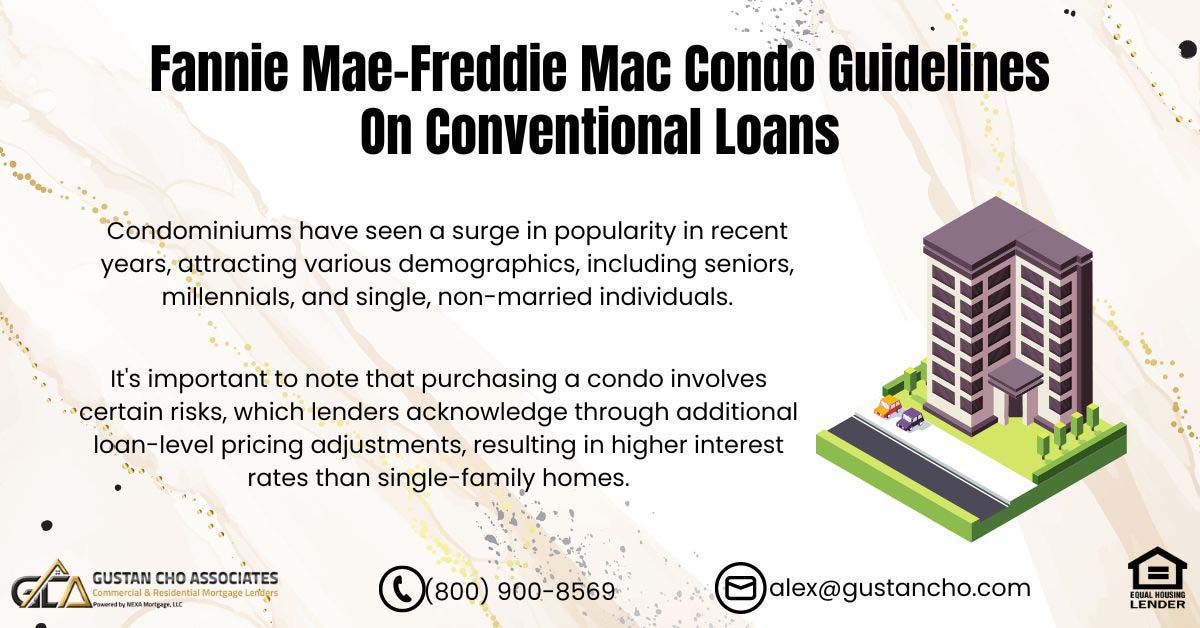


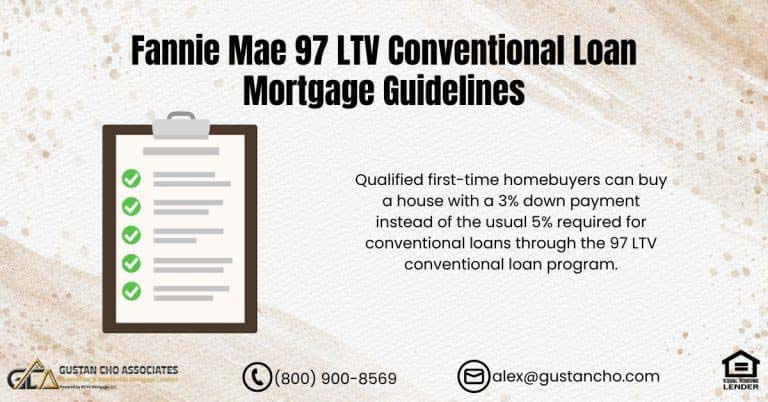
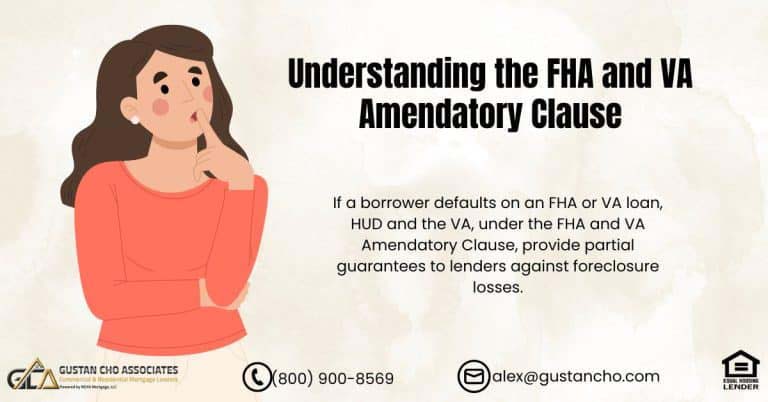

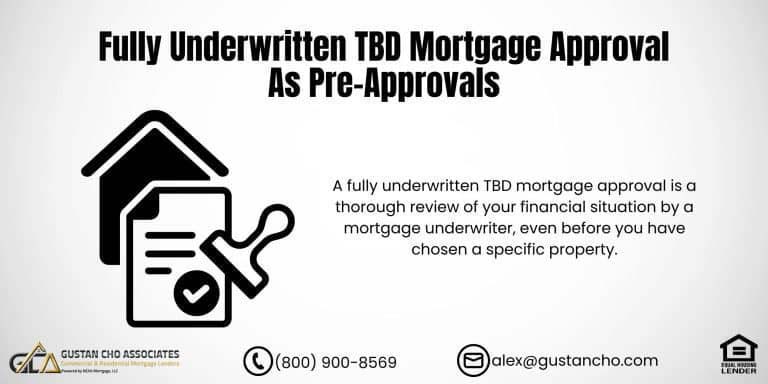
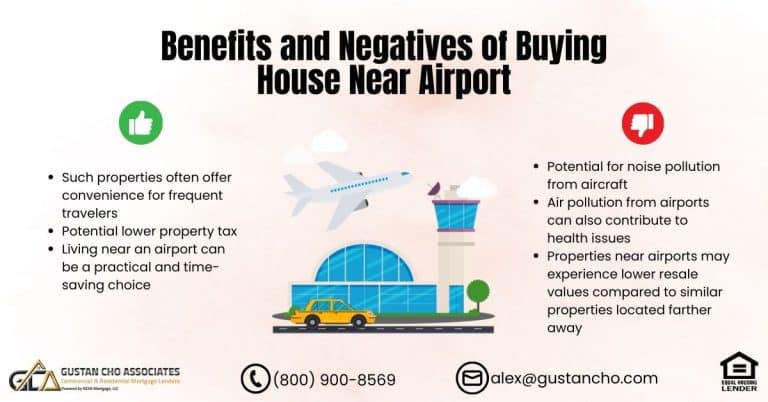
Gustan
Do you know when Fannie Mae begin asking for the the percentage of commercial to residential square footage for condo reviews for conventional mortages?
Was this prior to 2008 or after 2008?